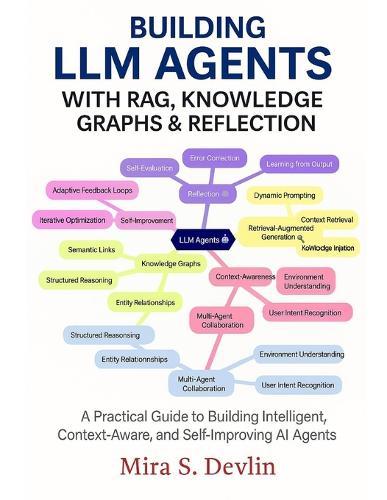Overview
Transform Large Language Models into Intelligent Agents That Reason, Retrieve, and ReflectIn Building LLM Agents with RAG, Knowledge Graphs & Reflection, AI systems architect Mira S. Devlin guides you beyond the surface of generative AI into the world of agentic intelligence-where LLMs evolve from reactive tools into dynamic collaborators capable of grounding responses in truth, understanding context, and improving over time. This book doesn't just explain concepts-it helps you build them. Each chapter blends theory, diagrams, and applied examples to show how retrieval, reasoning, and reflection interact inside modern AI agents. Whether you're constructing a self-updating research assistant or a multi-agent workflow, you'll gain a deep understanding of how today's most advanced cognitive systems are designed. What You'll Learn The Cognitive Core of AI Agents Understand the architecture of transformers, tokenization, and attention. Explore the shift from static LLMs to adaptive, outcome-driven agents. Learn how retrieval, reflection, and reasoning form the four pillars of intelligence. Retrieval-Augmented Generation (RAG) Implement retrievers, rankers, and generators using open-source frameworks. Evaluate accuracy with metrics like Recall@K, Precision@K, and grounding quality. Build a working RAG-powered knowledge bot capable of live data integration. Knowledge Graphs and Structured Reasoning Design and query graph-based knowledge systems using Neo4j, ArangoDB, or GraphRAG. Represent relationships between data entities for context-rich reasoning. Combine structured knowledge with unstructured language for explainable AI. Reflection and Cognitive Loops Implement Plan → Act → Reflect → Revise cycles for self-improving intelligence. Explore short-term and long-term memory systems for continuous learning. Multi-Agent Collaboration Architect intelligent teams of agents that can plan, delegate, and verify results. Understand communication protocols, cooperative memory, and role specialization. Use frameworks like CrewAI, LangGraph, and AutoGPT2 to orchestrate coordination. Each chapter concludes with an ""Agent in Action"" section-hands-on projects and guided workflows that turn abstract concepts into working systems you can build, extend, and deploy. Key Features: End-to-end coverage: From LLM fundamentals to advanced RAG and reflection architectures. Framework-agnostic examples: Concepts applicable to GPT, Claude, Gemini, and open-source models. Practical code labs: Step-by-step walkthroughs in Python with modular components. Visual clarity: Concept diagrams, data flow maps, and evaluation schematics throughout. Debugging insights: Identify hallucinations, reasoning gaps, and retrieval errors with real-world examples. Scalable design patterns: Extend single-agent models into multi-agent collaborative systems. About the Author: Mira S. Devlin is an AI systems architect specializing in the intersection of language models, retrieval pipelines, and knowledge reasoning frameworks. Who This Book Is For: AI developers, data scientists, and engineers who want to move beyond simple LLM prompts. Architects and product innovators building intelligent, explainable, and adaptive AI systems. Researchers and students seeking a structured understanding of retrieval-based reasoning and reflection. Tech leaders and educators integrating agentic AI into enterprise or academic zone.
Full Product Details
Author: Mira S Devlin
Publisher: Independently Published
Imprint: Independently Published
Dimensions:
Width: 21.60cm
, Height: 1.70cm
, Length: 27.90cm
Weight: 0.735kg
ISBN: 9798273159013
Pages: 316
Publication Date: 05 November 2025
Audience:
General/trade
,
General
Format: Paperback
Publisher's Status: Active
Availability: Available To Order

We have confirmation that this item is in stock with the supplier. It will be ordered in for you and dispatched immediately.



